
Enabling innovation and commercialisation
Research in the mathematical sciences provides a critical foundation of new knowledge, proofs, algorithms, methods, tools, and technologies.
In addition to supporting advancement of research across all disciplines, the knowledge and outputs of research in the mathematical sciences are key enablers for new knowledge and value creation, including research translation via innovation, commercialisation, and technology transfer.
ACEMS enables research translation via the following mechanisms:
- directly, from outputs within ACEMS’ disciplines, via knowledge transfer, technology transfer, licensing, and new value and venture creation by ACEMS members, collaborators and other stakeholders; and
- indirectly, including by enabling other disciplines to create and then leverage new knowledge across other fields of research and in the technology and other sectors.
Some examples of the Centre’s direct enablement of research translation, innovation and entrepreneurship efforts of ACEMS members leveraging the outputs of their own or other ACEMS members’ research are provided below. There are also examples in other sections of this report, such as the Safe Blues case study and some of the Impact Case Studies such as for FLEW Solutions.
Support for Research Translation, Innovators, and Entrepreneurs
The Centre supports members to develop innovation and entrepreneurship knowledge and skills and to translate research into new value via innovation and entrepreneurship. This includes:
- ACEMS educational events, including at presentations at the Annual Retreat
- Direct support, including mentoring from ACEMS members including ACEMS Stakeholder Engagement Coordinator (who has a background in entrepreneurship lecturing and training)
- Referral to opportunities for building skills, knowledge, and networks, including ACEMS university node programs, industry, and investors
ACEMS Annual Student and ECR Retreat Presentations
The ACEMS Annual Student and ECR Retreat featured presentations and discussions on a number of key topics for research translation and support, including talks by guest speakers in a session entitled “Grants and Funding Opportunities” where:
- UNSW Professor Jason Sharples provided advice for attracting research funding and leveraging funding to realise greater research opportunities and impact;
- Drawing from her faculty, research, consultancy, and venturing experience (see MATILDA case study below), ACEMS CI Kate Smith-Miles provided an overview of the many ways researchers can achieve impact (in and beyond academia), including by working with external stakeholders and harnessing various support/training options; and
- ACEMS PhD student, and entrepreneur, Edward Barker discussed benefits of research commercialisation, including for funding research, and insights from his experience commercialising research and founding a business consultancy and startup (as outlined in the case study below).
Case Study 1: OSCEN Research

OSCEN Research Pty Ltd is a company co-founded by ACEMS part-time PhD student Edward (Ed) Barker, who made the decision to commercialise research pursued in his masters and his current PhD.
“Oscen Research is harnessing the potential of highly-generalisable algorithms to improve supply chain management via reinforcement learning. The power of this technology to sift through and consider a vast array of potential outcomes at speed may save Australia billions.”
Oscen is a research-driven consultancy which provides machine learning and AI solutions to solve optimisation problems across a range of industries, including supply chain management, transport logistics, control in manufacturing and many others. They apply their own unique technological solutions and software to allow businesses to save money by finding more efficient solutions to complex planning problems.
Since founding OSCEN Research, and organising a first trial of the new technology in 2019 (with ACEMS support), Ed has made significant further progress in relation to commercialisation of his research and shares his experiences with ACEMS members such as via his talk at the ACEMS Annual Student ECR Retreat.
ACEMS continues to be amongst the supporters of OSCEN Research, by providing entrepreneurship mentoring, promotion, and industry introductions and setting up meetings Key industry engagements enabled by ACEMS in 2020 included:
- Multiple meetings across themachine learning group of Oracle
- Discussions with DST Group’s Leader of Decision Support Systems, from the Joint and Operational Analysis Division (JOAD), about the potential application of the AI to funded ORNet challenges for researchers/technologies
- A meeting with co-founder of Lyro Robotics and Brisbane AI, Dr Luxi Leitner, to discuss research commercialisation from entrepreneurial researcher perspective
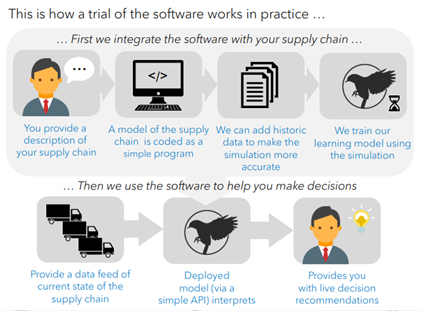
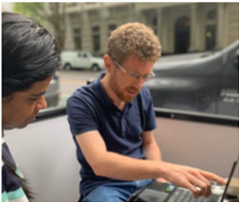
OSCEN Research Commercialisation Highlights for 2020
Some of Ed’s commercialisation highlights at OSCEN Research in 2020 include:
- Participation in research commercialisation and entrepreneurship programs including:
- University of Melbourne’s TRAM Track program (an 8-week pre-accelerator program to develop customer insight)
- University of Melbourne TRAM Runway program (a 12-week accelerator)
- Pitch presentations to industry and investors
- Involvement in conducting over 100 customer interviews for market research and validation
- Commencement of four new industry trials of the technology as part of R&D and market feedback
- Gaining feedback from industry and target customer research to further focus commercial solutions for the beachhead market
- A presentation at ACEMS Data Science Workshop with industry guests with potential interest in the technology
- Early discussions with CSIRO’s $240m innovation fund, Main Sequence Ventures, who expressed interest in the technology and discussions as commercialisation progresses, leading to customer acquisition
- Ongoing negotiations for a Defence project
Case Study 2: Matilda
ACEMS CI Kate Smith-Miles has a strong background in realising impact from her research. She first developed MATILDA as a research platform via the project “Stress-testing algorithms: generating new test instances to elicit insights”, with Australian Laureate Fellowship scheme funding.
The powerful new methodologies and tools developed from this research have been applied with impact in both academia and industry, to respectively:
- support greater rigor in algorithmic science research, with the MATILDA team supporting researchers to better stress-test algorithms (to identify potential bias and relative strengths and weaknesses), which has yielded co-authored publications and impactful research outputs
- stress-test algorithms for commercial applications prior to use in software, providing both industry benefits and researcher benefits such as new commercial revenue streams to support further research, development, and the MATILDA team
Highlights in 2020 include:
- Kate’s pitching of MATILDA to a group of venture capitalists, highlighting its benefits for stress-testing algorithms
- Acceptance for publication of a paper highlighting the benefits of applying the MATILDA methodology in algorithmic science research (see details below), demonstrating the importance of stress testing and thinking about bias in datasets used to test algorithms and draw conclusions
Learn more about the MATILDA platform and methodology
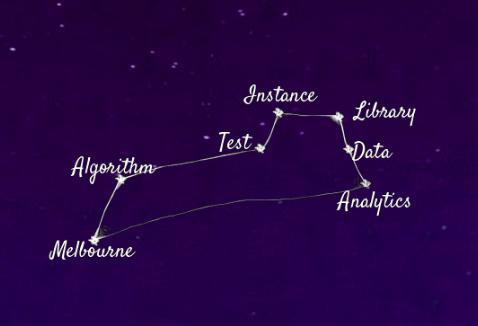
The MATILDA research platform focuses on stress-testing algorithms to reveal strengths, weaknesses and biases and generating new test instances, methodologies and tools to support such analysis and elicit insights.
The methodology has been applied in research, commercial and defence settings, and for a wide variety of “algorithmic science” fields including: combinatorial optimisation, continuous black-box optimisation, machine learning, time series forecasting and software testing.
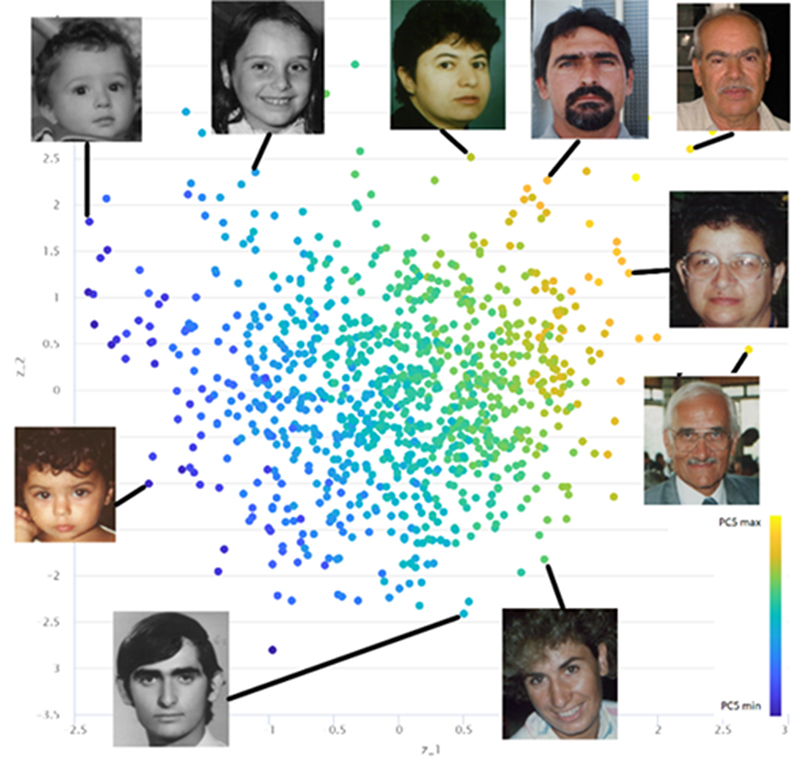
Demonstrating the power of the MATILDA method by “Revisiting Facial Age Estimation with New Insights from Instance Space Analysis”
When demonstrating the effectiveness of a new algorithm, researchers are traditionally encouraged to compare their algorithm's performance against existing algorithms on well-studied benchmark test suites. In the absence of more nuanced methodologies, algorithm performance is typically summarized on average across the test suite examples. This paper highlights the potential bias of conclusions drawn by analyzing “on average” performance, and the opportunities offered by a recent testing methodology known as instance space analysis. While focused on facial age estimation, the methodology and lessons learned from the case study are broadly applicable to any study seeking to draw conclusions about algorithm performance based on empirical results.
Case Study 3: Wondrous Worlds
ACEMS PhD Student, Author, Illustrator, Poet, and Social Impact Entrepreneur Katie Buchhorn spent time during the COVID-19 pandemic writing a children’s book that she both authored and illustrated.
Venturing can take many forms, as Katie demonstrated in her book entitled “Wondrous Worlds” that celebrates mathematics and the opportunities it affords. Katie will publish the book in early 2021, and aims to:
- Deliver important messages (in a fun, engaging, evocative, and poetic format, that’s accessible to readers of all ages) highlighting the beauty and value of the mathematical sciences
- Engage audiences via spoken-word poetry readings and outreach to school students;
- Better inform students regarding career-opportunities enabled by pursuing STEM studies
- Contribute profits generated from book sales towards realising a positive impact for mathematics education and participation
ACEMS will support Katie’s outreach efforts and encourage her social entrepreneurial efforts to realise these aims.
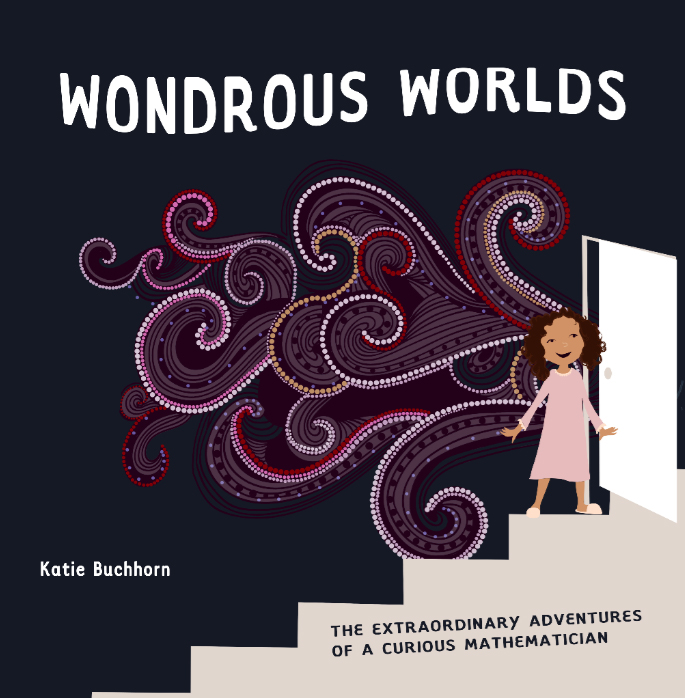
Wondrous Worlds follows “the adventures of a curious and creative young mathematician as she embarks on an awe-inspiring journey” and travels “in space and time through the landscapes of abstract logic, technology, computer thoughts and data science”.
The book celebrates the “worlds of opportunity await those who dream in numbers”, the power of a growth mindset, diversity in STEM, and the vast and varied worlds of - and diverse career opportunities enabled by pursuit of studies in - Science, Technology, Engineering and Maths (STEM).
Case Study 4: Datathons and Hackathons
ACEMS members are encouraged to develop knowledge, skills, and networks, including by participating in hackathons and datathons. Participation in such events can teach valuable problem-solving, team work, and commercialisation skills and potentially seed new solutions of value, leading to new collaborations, research commercialisation, innovations and startups.
A number of these events were hosted or supported by ACEMS in 2020, including the Queensland AI Hub’s inaugural Medical Datathon, which attracted a diversity of academic and industry participants, across diverse disciplines. ACEMS members contributed to the success of the hackathon, delivering presentations, and as part of award-winning teams acknowledged for developing beneficial solutions.
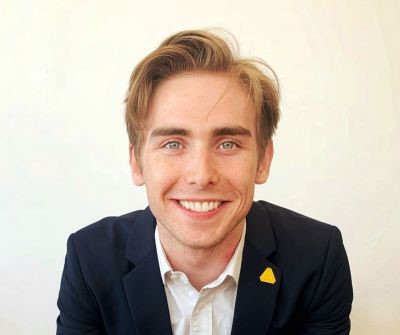
The winning team, which included ACEMS Masters Student Tobin South, tackled problems associated with patient consent forms used in healthcare, aiming to increase patient understanding, particularly amongst culturally, linguistically, intellectually diverse patients.
They devised “Clearer Consent” - being a patient-tailored dynamic consent form, enabled by an AI-assisted informed-consent process, suitable for use in an app/platform.
The team also worked on progressing development of the solution post-hackathon, including by working on coding and digitising forms (inc. for using NLP).
Going forward, they intend to be active in a clinical setting, to test and gain key stakeholder feedback on the solution, to solve any problems and better adapt the product to suit the needs of the key stakeholders (including patients from diverse backgrounds, and clinicians) and solve any problems.
Watch the post-medical datathon video presentation featuring ACEMS student Tobin South and his teammate speaking about their hackathon experience and solution.
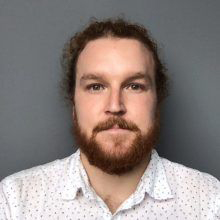
ACEMS masters student Owen Forbes' multi-disciplinary team were the joint People's Choice Award winners and finalists for their "Computer-aided diagnosis of lung nodules (CADxLN)" project.
The team combined data science and clinician expertise and experience with the aim of developing an AI tool for hospitals, to reduce both the under- and over-diagnosis of cancer.
The AI solution they pitched would: systematically improve nodule detection, to reduce the risk of radiologists missing early signs of cancer; and perform multi-variable lung cancer risk estimation, allowing rational triage of follow-up. Uniquely, by linking to iEMR, this model will incorporate nodule and patient characteristics and produce an automated report integrated into the final CT report subject to radiologist endorsement.
They are now proposing development work on an AI tool/software (to reduce under/over-diagnosis of lung cancer using ML/AI image processing) - and possibly a later research component - comparing performance of different modelling approaches, including logistic regression in a Bayesian framework. In terms of deciding risk thresholds for triaging time to the next follow up scan, a Bayesian approach could offer clinical utility through estimates of the probability distributions/quantified uncertainty of the model predictions.
Owen’s team has the opportunity to further develop their solution, with support from the Queensland AI Hub and AWS, and may also apply to ACEMS funding schemes for research.